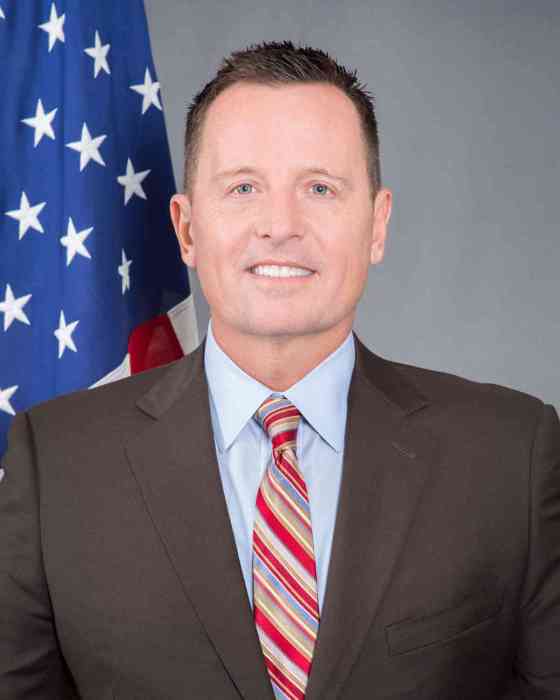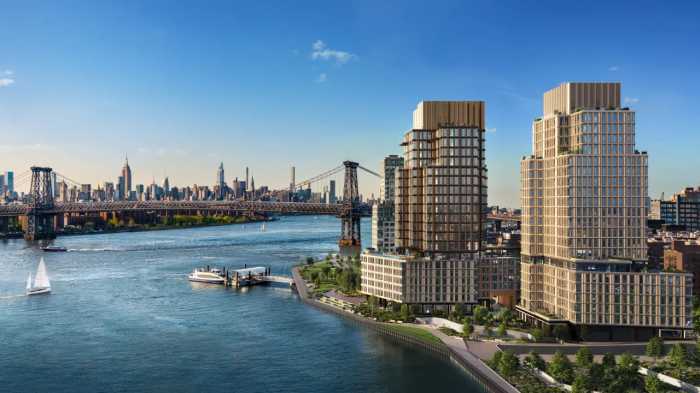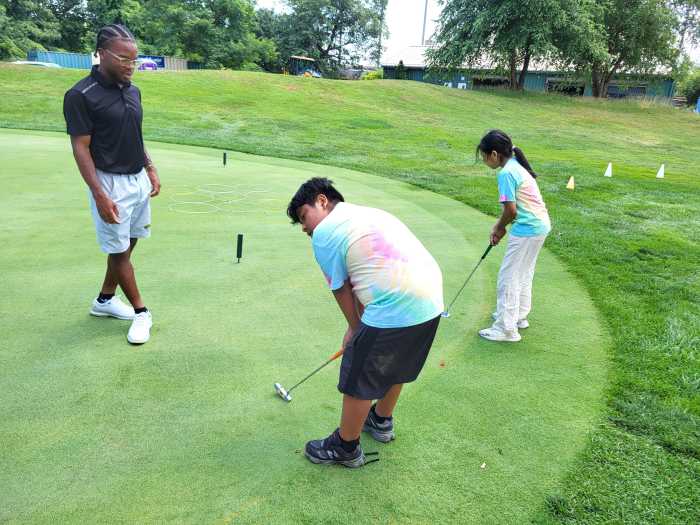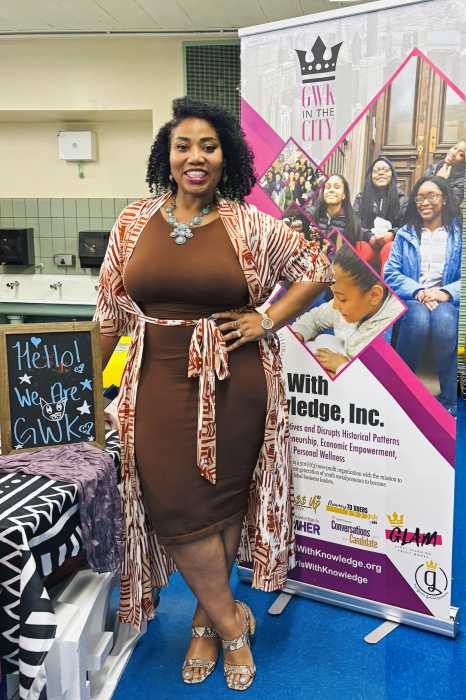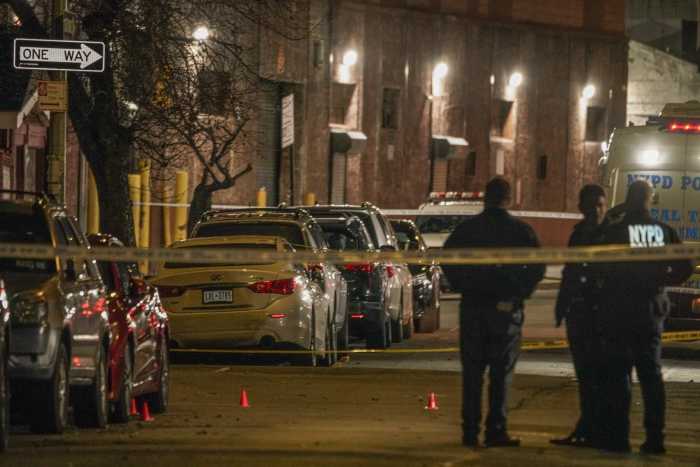Joy Phindi Malaza at the US State Department offices near the United Nations in Midtown. | GAY CITY NEWS
Where in the world could endemic homophobia be cured — if only briefly — by a game of soccer? One such place is South Africa, a country united by sports and an idyllic post-apartheid Constitution, but divided by social and cultural realities that can seep in with violent force. Something about that nation’s post-apartheid constitutional guarantee of equality is not connecting with events on the ground, according to Joy Phindi Malaza, who works with a Johannesburg-area women’s group comprised largely of black lesbians.
The disparity can be starkest, she said, when it comes to the safety of lesbian, gay, bisexual, transgender, and intersex (LGBTI) South Africans.
Malaza is the program coordinator at the Forum for the Empowerment of Women (FEW), based in the black Soweto district, and she was in New York and other US cities in late winter under the sponsorship of the State Department’s International Visitor Leadership Program.
Black lesbian activist, on US tour, explains how visibility is helping culture catch up with a constitution
FEW’s mission is to fight the injustice and violence faced by the LGBTI community, particularly lesbians. Though small, the group has achieved notable successes. In a country where the promise of equality for lesbians and women overall is undercut daily by targeted rape and murder, FEW stands as a symbol of bravery and, perhaps more importantly, the future.
In 1996, the new Southern African Constitution drawn up at the behest of Nelson Mandela was the world’s first to specifically incorporate protections based on sexual orientation. In one fell swoop, the nation went from being a rigidly segregated society to one that embraced progressive values that Western Europe and the US were still struggling with.
A decade later, it adopted same-sex marriage, becoming the only African country to do so. In the intervening years, South Africa struck down its sodomy laws, broadened employee benefits to include same-sex couples, and leveled immigration rights between gays and straights. The legal progress was breathtaking, but for LGBTI South Africans, the reality has far too often been bleaker.
According to the State Department’s 2011 Human Rights Report, South Africa is one of the most violent countries in the world. The rates of murder and rape were staggering, with 55,000 rapes reported in a population of just over 50 million. That tally is probably only a percentage of those that occurred, and the conviction rate is a paltry four percent. The disproportionate impact of rape on lesbians is tied to popular attitudes toward homosexuality.
Despite the Constitution’s equality clause, 80 percent of South Africans believe that sexual activity between persons of the same sex is wrong, and “corrective rape,” which men use to “cure” lesbians, is a common occurrence. That cure in many cases leads to a woman’s death.
“We have a lot of political leaders who say a lot of contradictory things with the Constitution,” Malaza explained. “And that helps perpetuate the violence.”
Jacob Zuma, the current president, is “traditional” in his values, she explained, and generally remains mum about problems facing the LGBTI community. Zuma’s values are particularly prevalent throughout the poor black townships surrounding South Africa’s larger cities. His “traditionalism” ironically embraces a largely Christian-based worship practice hostile to homosexuality. In that worldview, gay identity — and not Christianity — is the Western import, one that triggers suspicion and worse.
“We hear, ‘It’s against the Bible, it’s against our traditions as black people,’” said Malaza. “We still live in a very patriarchal society.”
Malaza explained that the violence faced by lesbians throughout South Africa is a response not only to their sexuality, but also to their gender presentation.
“When you look at the killings and rapes, it is usually butch women,” she said, recounting the fear one of her co-workers has as she returns home in the evening.
Approximating the attitude adopted by men who rape and murder lesbians, Malaza said, “We’ll show you what you’re missing. These women choose to appear this way, and that’s not how it should be.”
Butch gender presentation is seen as an affront to masculinity, she explained, something that must be corrected.
Among the most notorious such incidents was the 2008 murder of Eudy Simelane, a well-known openly lesbian soccer player, who was killed after suffering a corrective rape in a field in her hometown. Only two of the four men charged in the crime were convicted, and as the New York Times reported, one of the two left the court room smiling. “Ach, I’m not sorry at all,” he stated.
Simelane’s murder was a high profile case, one that is emblematic of the severity of violence aimed at the LGBTI community. That violence, even after escalating from rape to murder, does not necessarily end at a gunshot or stabbing.
“It’s very rare where you find a lesbian woman who’s been raped” without also having been mutilated in some way, Malaza said.
Simelane was stabbed nine times, including three deep cuts in her inner thighs.
Malaza added, “We feel there is some sort of message sent through this.”
The South African Hate Crime Working Group, in its 2012 report to the nation’s High Commissioner for Human Rights, pinpointed one cause for the increased violence against LGBTI persons. “Openly gay men and women across the country… have been targeted because of their visibility,” the report stated.
This observation raises yet another contradiction about South African society. Just how is it that visibility is so high in a country where violence is prevalent and being out can have lethal consequences? In fact, Malaza indicated, despite the nation’s legal protections, coming out is not an option chosen universally among LGBTI South Africans, nor does it play out the same in all people. Still, FEW is helping on this score as well.
“The more visibility there is, the more attitudes can change,” Malaza said, even while acknowledging the potential harms that can result from being open. “We share stories of coming out, but we also know it’s a personal journey.” FEW, she indicated, aims to create the safe spaces where lesbians can explore their options with the support of others. The organization addresses the intersectional oppression faced by its members, who are black, female, and lesbian.
“Sometimes it may not be the best idea to come out in your family until you’re at the point where you can stand on your own if you’re rejected,” Malaza said. And some LGBT South Africans consider going back into the closet out of fear when they hear of hate crimes targeting others like themselves.
Begun in 2001, FEW has expanded beyond the confines of Soweto through a variety of initiatives. What began as an organization delivering social services aimed at helping survivors of rape and their families has become a national project tackling local issues facing different communities. The Community Intervention program is designed to build and sustain membership in black townships across South Africa. The School Project aims to create safe learning environments for all individuals, with a particular focus on LGBTI folk. And the Soweto Pride Festival has increased FEW’s visibility in the public eye.
“We have Soweto Pride, where we can take that space and claim it just for a day,” Malaza said, explaining that the parade and related festivities, while small, are growing each year.
“People will say, ‘I’ve never seen a gay person. They’re supposed to look a certain way,’” Malaza mused, rightfully proud of her organization’s ability to change people’s minds for the better.
Even more than pride celebrations, sports can contribute to achieving this goal.
The Peg Grey Women’s Sports Tournament, in which female teams from the area play netball, volleyball, soccer, and basketball, was for a time an annual event, named after the lesbian activist from Chicago who adopted Chosen FEW, the organization’s team. Malaza recounted how the team served to boost self-esteem and confidence among lesbian players, who found both community and educational opportunities there.
Describing the tournament games that drew huge community crowds, Malaza explained, “Men who may be homophobic at other times are there, and they’re supportive. When there’s a game in one of these townships, everyone comes.”
And in doing so, they gave FEW the opportunity to challenge a culture that has condoned too many hate crimes.
Participating in the State Department’s International Visitor Leadership Program, Malaza also brought FEW’s message to the US. The Leadership Program is designed to expose representatives from other nations to the expertise and thinking of peers in the US. In New York, Malaza met with officials at the Anti-Violence Project, the LGBT Community Center, the Gay and Lesbian Alliance Against Defamation, and the International Gay and Lesbian Human Rights Commission — as well as the NYPD.
She also made stops in Washington, San Francisco, Madison, Wisconsin, and Jackson, Mississippi. Her meetings focused on issues of LGBT advocacy, anti-violence initiatives, and youth empowerment, as well as the history and culture of the American LGBT movement.
Despite her pride in FEW’s successes and its ability to make a difference, Malaza revealed that it has also run into problems. Chosen FEW, the soccer team that proved a valuable political voice for the organization and lesbians in general — particularly in its members’ outspoken criticism of the botched trials following Eudy Simelane’s murder — has been disbanded because of lack of funding.
And, with LGBTI visibility still limited in South Africa, FEW has an understandably difficult time finding allies in its home country.
“We want to expand to doing more political work,” Malaza said. “When we march in the streets, we also want our parents and family there.” That wish for support, both emotional and political, certainly has universal resonance for LGBTI people across the globe, but in her telling, it was tinged with a degree of sadness.
Still, the trip to America, Malaza said, helped her gain clarity about what support her organization may need and from whom.
“It helps to get other ideas,” she said. “When you’re sitting in a very homophobic country, even your ideas can be limited.”
Asked what support she would like from the international community, Malaza said, “The challenge really is around resources,” but she hastened to add that gaining international financial support is not at the top of her list.
“We would love support,” she said. “Putting pressure on accountability in terms of hate crimes in our country.” Such international pressure, she argued, could force a positive response from the political powers that be in South Africa.
Achieving FEW’s ultimate goal, however, may take much more.
“We want LGBTI people to really enjoy the rights that are in our Constitution,” said Malaza, who acknowledged that may be a long way off.
Visibility, she maintained, is the indispensible first step, despite the dangers.
“I’ve always believed in living life the way you see fit, so I didn’t see a need to be closeted,” she said.
For all the South Africans who don’t see themselves in that same position of freedom, they are fortunate, at least, that people like Phindi Malaza and groups like FEW are standing up to hasten the day when real transformation is within grasp.



